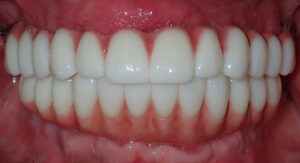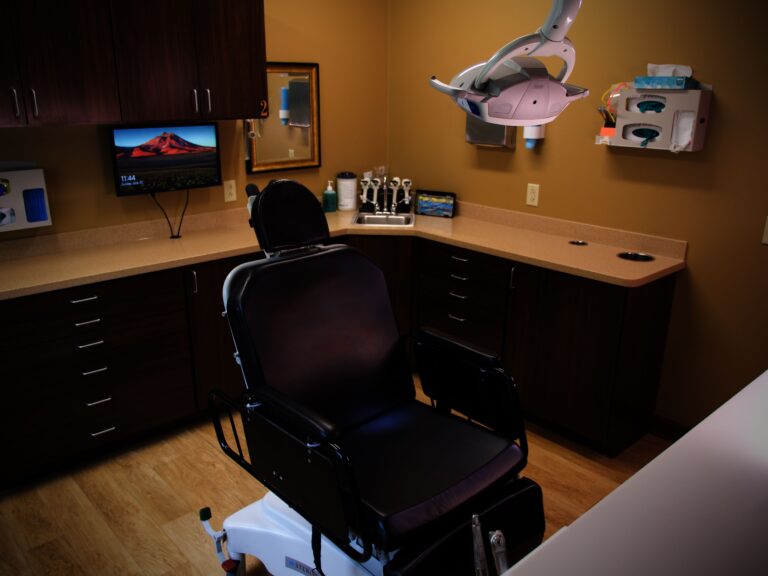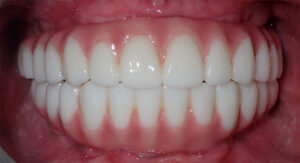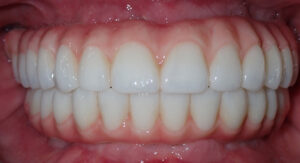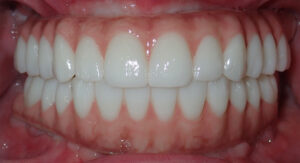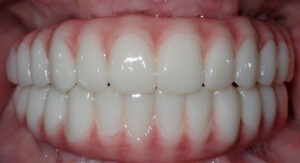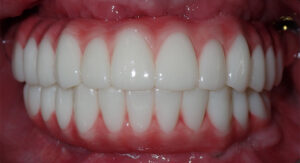What Are Same-Day Dental Implants and How Do They Work?
Same-day dental implants replace missing teeth in one visit. In this procedure, a titanium implant is placed into the jawbone immediately, and a temporary prosthesis (crown or bridge) is attached during the same appointment. The process starts with a thorough clinical assessment and digital imaging to plan precise implant positioning. Local anesthesia is used to ensure comfort while the dentist removes any damaged tooth structure, prepares the site, drills into the jaw, and places the implant. The immediate attachment of the temporary prosthesis ensures both aesthetics and function right away.
Unlike traditional implants that require waiting several months for healing, same-day implants allow you to leave with a restored smile. Advanced computer-guided technology and cone-beam computed tomography (CBCT) help assess bone density, anatomical variability, and nerve locations to reduce errors. The custom provisional prosthesis is designed to avoid excessive load, promoting proper osseointegration. Innovations in implant surfaces and bioactive materials further improve long-term success. Both dentists and patients benefit from fewer appointments, reduced discomfort, and minimized anxiety.
What Is the Same-Day Dental Implant Process?
The process begins with a thorough consultation that includes dental and radiographic examinations to evaluate jawbone health. Digital scans and three-dimensional images guide the creation of a surgical guide for precise implant placement. After discussing treatment options and risks, the procedure is performed under local anesthesia.
On the day of treatment, any necessary tooth extractions are performed and the implant site is prepared using the custom guide. The titanium implant is then inserted and a temporary abutment followed by a provisional crown is attached. This provisional restoration is designed to put minimal functional load on the implant while it integrates with the bone. The surgery is typically completed within a few hours, and postoperative instructions focus on oral hygiene and dietary restrictions. Follow-up appointments ensure that the implant is integrating properly, all while digital planning and minimally invasive techniques reduce surgical time and recovery duration.
How Do Same-Day Implants Differ From Traditional Implants?
The key difference is the timeline. Same-day implants integrate implant placement and restoration in one appointment, whereas traditional implants require multiple visits: an initial surgery, a healing period of three to six months for osseointegration, and then placement of the final prosthesis. Traditional methods may involve bone grafting or temporary dentures, while same-day implants are performed when there is sufficient healthy bone, eliminating the need for augmentation.
Immediate loading is achieved by carefully designing the provisional crown to limit functional stress. Although both methods can yield similar long-term outcomes when carefully selected, same-day implants offer the advantages of reduced treatment time, fewer surgeries, and less patient discomfort.
What Are the Benefits of Choosing Same-Day Dental Implants?
Benefits include: • Rapid restoration of function and appearance, boosting confidence immediately. • Fewer surgical interventions and dental visits, which reduce overall treatment time and costs. • High precision through advanced imaging (e.g., CBCT) and computer-aided design that reduces postoperative complications. • Preservation of jawbone and gum tissue contours, which helps maintain a natural facial appearance. • Faster recovery with reduced swelling, pain, and anxiety compared to traditional procedures.
These advantages combine to offer both immediate aesthetic satisfaction and effective long-term dental health.
Who Is an Ideal Candidate for Same-Day Dental Implants?
Ideal candidates have healthy, dense jawbone and gum tissue, with localized tooth loss that does not require extensive bone grafting. Good oral hygiene and commitment to follow-up care are essential. Those with chronic periodontal disease, uncontrolled diabetes, severe osteoporosis, or a history of head and neck radiation may require additional preparation before the procedure.
Although there is no strict age limit, younger patients with robust bone density typically have more predictable outcomes. However, older patients in good systemic health can also be excellent candidates if any age-related bone loss is managed. The key is a stable oral environment that supports immediate implant placement without complications.
What Dental and Health Conditions Affect Implant Candidacy?
Several factors determine eligibility: • High bone quality and healthy gums are necessary for successful osseointegration. • Active periodontal disease, untreated gingivitis, or chronic infections may compromise implant stability. • Systemic conditions such as uncontrolled diabetes, immune disorders, or cardiovascular diseases can adversely affect healing. • A history of radiation therapy, use of bisphosphonates, and smoking also present higher risks. • Parafunctional habits like teeth grinding (bruxism) may jeopardize the implant.
A comprehensive evaluation—through blood tests, CBCT imaging, and periodontal assessments—is critical to determine if the patient’s overall dental and systemic health is suitable for same-day implants.
How Does Age Influence Eligibility for Same-Day Implants?
Age is important but not the sole factor. Younger patients often have higher bone density and quicker healing, ideal for immediate implant placement. However, older patients can also be candidates if they maintain good oral hygiene and systemic health. Modern imaging helps assess bone quality in all age groups, and treatment protocols can be adjusted (such as minimally invasive techniques) to address age-related changes. In essence, a holistic assessment of both oral and systemic health, rather than age alone, determines candidacy for same-day implants.
Can Patients With Tooth Loss or Extraction Sites Qualify?
Patients with tooth loss or recent extraction sites can qualify if the site is free from infection and has sufficient bone mass for the implant. A minimally invasive extraction that preserves the alveolar bone is ideal. Detailed imaging, including digital radiography and CBCT scans, confirms that the extraction site is suitable. Even if teeth were lost due to trauma or decay, a comprehensive dental evaluation is conducted to rule out underlying issues. Overall, patients with healthy extraction sites and good overall oral hygiene are excellent candidates for same-day implants.
How Do Dentists Evaluate Your Suitability for Same-Day Implants?
Evaluation involves: • Thorough diagnostic tests including dental X-rays, digital scans, and CBCT imaging. • Detailed reviews of the patient’s medical and dental histories to exclude contraindicating factors like uncontrolled diabetes or immune disorders. • Assessments of bone density and periodontal health to ensure sufficient support for the implant. • Analysis of occlusal relationships so that the provisional restoration minimizes stress on the implant.
Advanced tools such as intraoral scanners and 3D planning software enable a virtual simulation of the implant placement. This comprehensive process ensures only patients with optimal conditions proceed with same-day implant procedures.
What Diagnostic Tests Are Used to Determine Candidacy?
Key diagnostic tests include: • Cone-beam computed tomography (CBCT) scans, offering three-dimensional images for detailed bone density, volume, and anatomical assessments. • Digital radiographs (periapical and panoramic X-rays) to identify previous infections or bone resorption. • Periodontal evaluations to assess gum health and measure pocket depths. • Digital impressions with intraoral scanners to create virtual models that help plan precise implant placement. • In some cases, blood tests to check for systemic conditions affecting healing.
These tests collectively guide dentists in selecting suitable candidates and in customizing treatment plans to reduce risks.
How Is Bone Density and Jaw Health Assessed?
Bone density and jaw health are assessed using a combination of: • CBCT scans for high-resolution, three-dimensional images that reveal bone quality, thickness, and any irregularities. • Panoramic radiographs for a broader overview of dental structures. • Clinical examinations of oral hygiene, gum health, and periodontal probing to determine the depth of any gum pockets. • Evaluation of occlusal forces and jaw alignment to ensure that functional stresses will not disrupt implant stability. • Occasionally, additional tests such as DEXA scans for bone density may be used when systemic conditions are a concern.
These assessments ensure that the implant will be securely integrated and help identify any need for preparatory treatments.
What Role Does Medical History Play in the Evaluation?
A thorough review of medical history is essential. Dentists collect information on: • Chronic illnesses such as diabetes, cardiovascular disease, and osteoporosis, which can affect healing. • Medications like bisphosphonates or corticosteroids that may compromise bone remodeling. • Prior surgeries or radiation therapy, particularly to the head and neck, that might affect bone regeneration. • Smoking habits, since nicotine reduces blood flow and impairs healing. • Previous dental procedures, including extractions and treatments for periodontal disease.
This comprehensive review allows dentists to predict healing outcomes and modify treatment protocols accordingly.
What Are Common Complications Associated With Immediate Implants?
Potential complications include: • Implant failure if osseointegration does not occur properly due to low bone quality or surgical errors. • Infection at the implant or extraction site if proper hygiene is not maintained. • Damage to nerves or surrounding tissues, causing pain or altered sensation. • Mechanical issues such as screw loosening or fractures from improper load distribution. • Bone recession or soft tissue inflammation if the provisional restoration places too much stress on the implant.
Preventative measures such as meticulous preoperative planning, digital imaging, prophylactic antibiotics, and strict postoperative care help mitigate these risks.
When Are Same-Day Implants Not Recommended?
Same-day implants are contraindicated for patients with: • Active infections or significant bone loss. • Uncontrolled systemic conditions (e.g., diabetes, severe osteoporosis, immunosuppressive disorders). • A history of radiation therapy that compromises bone healing. • Suboptimal oral hygiene or conditions like severe periodontal disease. • Parafunctional habits such as severe bruxism, unless additional protective measures are taken.
In these cases, a traditional multi-stage implant process with bone grafting or a delayed loading protocol may be recommended.
How Can Patient Comfort and Safety Be Ensured?
Patient comfort and safety are prioritized through: • Strict adherence to clinical protocols including comprehensive diagnostics and digital surgical guides. • Use of local anesthesia and sedation to ensure a pain-free procedure. • Minimally invasive surgical techniques, reducing tissue trauma and recovery time. • Customized provisional restorations designed to minimize stress on the implant. • Detailed postoperative instructions on diet, oral hygiene, and activity to optimize healing. • Regular follow-up appointments and remote monitoring to quickly address any complications.
This integrated approach helps create a secure and comfortable environment throughout the treatment.
How to Prepare for Your Same-Day Dental Implant Procedure?
Preparation involves both medical and lifestyle adjustments: • Undergo comprehensive dental examinations and digital imaging to map the implant site. • Follow preoperative instructions such as a strict oral hygiene regimen to reduce infection risks. • Avoid hard or chewy foods, smoking, and alcohol for several days before and after the procedure. • If advised, temporarily adjust medications that may increase bleeding risk. • Mentally prepare by discussing the process with your dentist and arranging support, such as a companion for will-call transportation. • Plan for a recovery period with minimal physical exertion and ensure a comfortable home environment with access to soft foods and medications.
This thorough preparation helps reduce anxiety and ensures optimal healing.
What Lifestyle Changes Support Successful Implant Placement?
Successful implant placement is supported by ongoing lifestyle changes: • Improve oral hygiene by regularly brushing and flossing, and use antimicrobial mouthwashes as recommended. • Adjust your diet by avoiding sugary and acidic foods; instead, include calcium and vitamin D-rich foods to strengthen bone. • Quit smoking and moderate alcohol consumption to enhance blood flow and healing. • Engage in regular exercise and stress management practices such as yoga or meditation to boost overall health. • Maintain regular dental checkups to monitor healing and address any issues promptly.
Adopting these habits not only supports implant success but contributes to long-term oral and general health.
How Should You Plan for Recovery and Aftercare?
Effective recovery and aftercare are essential: • Follow your dentist’s postoperative instructions closely, including maintaining excellent oral hygiene. • Adopt a soft-food diet for at least the first week to avoid stressing the implant. • Avoid strenuous physical activity immediately after surgery; light activities are encouraged to support circulation. • Schedule regular follow-up appointments to monitor osseointegration and adjust the provisional restoration as needed. • Prepare for minor side effects such as swelling or bruising and know when to contact your dentist. • Arrange a comfortable recovery environment at home with easy access to medications and a support system.
These steps help ensure a smooth healing process and strengthen long-term outcomes.
What Questions Should You Ask Your Dental Specialist?
Before proceeding, consider asking your dental specialist: • What is your experience with same-day implant procedures and the technology used? • Which diagnostic tests will be performed, and how do they ensure precise placement? • What is the expected healing time and how will the provisional restoration be managed? • What are the potential risks or complications, and how are they mitigated? • What are the complete costs, financing options, and insurance considerations? • Can you provide before-and-after examples or references from previous patients?
These questions help ensure that you are well-informed and comfortable with the treatment plan.
What Are the Costs and Financing Options for Same-Day Dental Implants?
Costs vary based on location, case complexity, and materials used. Generally, same-day implants have a higher upfront expense due to advanced technology and immediate restoration. However, the overall savings may result from fewer appointments, reduced need for temporary solutions, and less downtime. The total cost typically includes: • The implant, provisional, and final restorations • Diagnostic imaging and surgical fees • Follow-up appointments
Many practices offer financing plans, in-house payment programs, and dental insurance may cover a portion of the costs. Detailed, itemized estimates provided during the consultation help you understand the investment and available cost-saving options.
How Does the Cost Compare to Traditional Implant Treatments?
Same-day implants usually have a higher initial cost compared to traditional implants because they combine surgery and prosthetic restoration in one visit. Traditional procedures often involve multiple appointments, temporary dentures, and longer healing times. However, same-day implants may result in overall savings through fewer clinic visits, faster return to normal activities, and lower indirect costs such as lost work hours. When comparing both methods, the advanced precision of computer-guided surgery in same-day implants can reduce the risk of failure, potentially lowering long-term maintenance and revision costs.
What Insurance or Payment Plans Are Available?
A variety of financing options help make same-day implants more accessible: • Many dental practices work with third-party companies to offer low- or zero-interest payment plans. • Some in-house budgeting programs and special promotional offers may be available. • Dental insurance coverage varies but may cover part of the procedure, especially if it is deemed medically necessary.
Obtain clear, itemized cost estimates during your consultation to understand both direct and indirect expenses and review all available payment options.
Are There Long-Term Savings With Same-Day Implants?
Despite the higher initial cost, same-day implants can offer long-term savings by: • Reducing the number of dental visits, thus lowering transportation and absence-from-work costs. • Minimizing the need for additional surgeries or temporary solutions. • Providing a precise fit and faster healing that reduce revision costs. • Supporting overall improved oral health, which may lead to fewer emergency or secondary treatments.
These factors often result in overall cost savings over time, making the investment in same-day implants worthwhile.
How to Choose the Right Dental Practice for Same-Day Implants?
Selecting the best dental practice involves considering: • The implant dentist’s advanced training, experience with same-day procedures, and certification (e.g., from the American Academy of Implant Dentistry). • The availability of state-of-the-art digital imaging, computer-guided surgery, and CAD/CAM technology. • A comprehensive treatment approach including preoperative assessments, immediate surgical procedures, and detailed follow-up care. • Transparent pricing, flexible financing options, and positive patient testimonials.
Research and compare practices to ensure you choose a provider with a proven track record and a patient-centered approach.
What Qualifications Should Your Implant Dentist Have?
Your implant dentist should be board-certified and have specialized training in implant dentistry, including advanced education in oral surgery, prosthodontics, and periodontology. Key qualifications include: • Experience with digital planning and computer-guided surgical systems. • A portfolio demonstrating successful same-day implant cases. • Certifications from reputable organizations such as the American Academy of Implant Dentistry. • Strong communication skills to clearly explain procedures and aftercare. • Access to state-of-the-art technology like CBCT scanners and CAD/CAM systems.
High patient satisfaction and strong testimonials further indicate expertise and a commitment to personalized care.
How Important Is Technology and Equipment in Implant Success?
Advanced technology is critical for the success of same-day dental implants. Digital imaging, computer-guided surgical systems, and 3D planning software enable precise implant placement, reduce risks, and improve predictability. Modern equipment such as CBCT scanners provides detailed views of the jawbone, while CAD/CAM technology helps create custom surgical guides. This technological integration not only minimizes surgical complications but also supports rapid osseointegration and enhances patient communication. In short, state-of-the-art technology is a key component in achieving long-term implant success.
What Do Patient Reviews and Testimonials Reveal?
Patient reviews consistently indicate high satisfaction with same-day dental implants regarding aesthetics, function, and recovery speed. Many patients praise: • The efficiency of a single-visit procedure. • The immediate improvement in their smile and self-confidence. • The precision and safety afforded by advanced digital imaging. • The clear communication and thorough preoperative consultations. • The smooth recovery and effective aftercare.
The following table summarizes key points:
Category | Key Highlight | Example Benefit | Patient Comment |
Treatment Efficiency | Single-visit procedure | Reduced overall treatment time | “I got my new smile in just one day!” |
Aesthetic Outcome | Immediate provisional restoration | Instant boost in self-confidence | “My smile looked natural right away.” |
Technology Utilization | Digital imaging and CBCT scans | Enhanced precision and safety | “The technology made me feel very secure.” |
Patient-Centered Care | Comprehensive consultation | Customized treatment plan | “I appreciated the clear explanations.” |
Follow-Up and Aftercare | Regular monitoring | Minimal complications and smooth recovery | “The aftercare was top-notch.” |
These testimonials highlight that same-day implants combine advanced technology with personalized care, resulting in reliable, efficient outcomes.
Final Thoughts
Same-day dental implants offer a transformative dental solution that restores function and aesthetics in one visit. With advanced diagnostics, state-of-the-art technology, precise computer-guided procedures, and comprehensive aftercare, this treatment minimizes the inconvenience and long-term costs associated with traditional implants. Well-informed candidates who meet the strict criteria can enjoy immediate improvements in their smile and overall quality of life, making same-day dental implants a highly effective option for restoring dental health.
